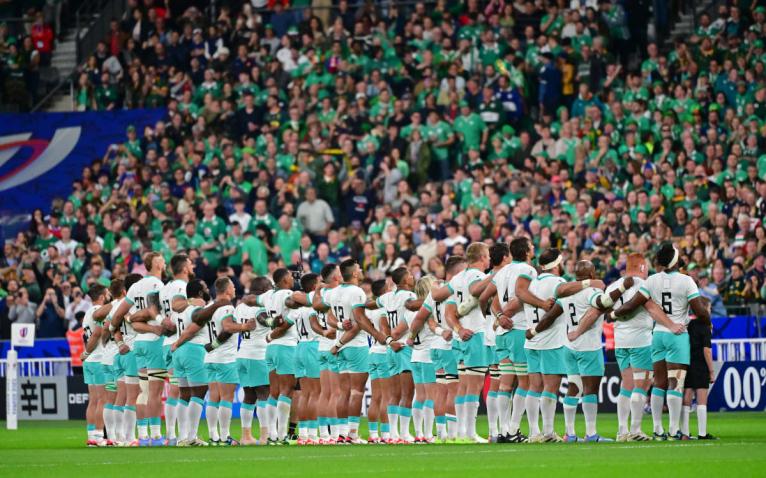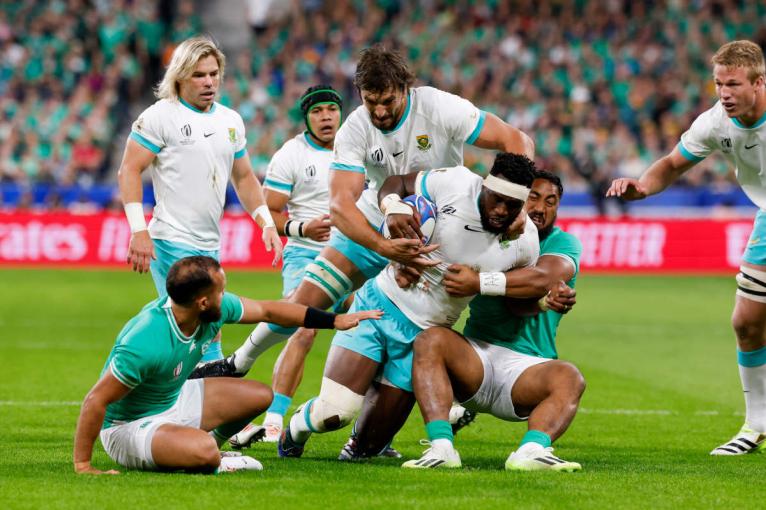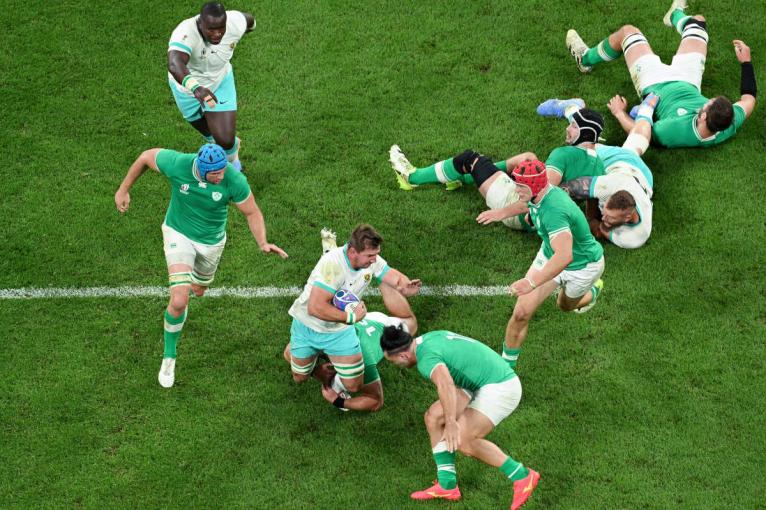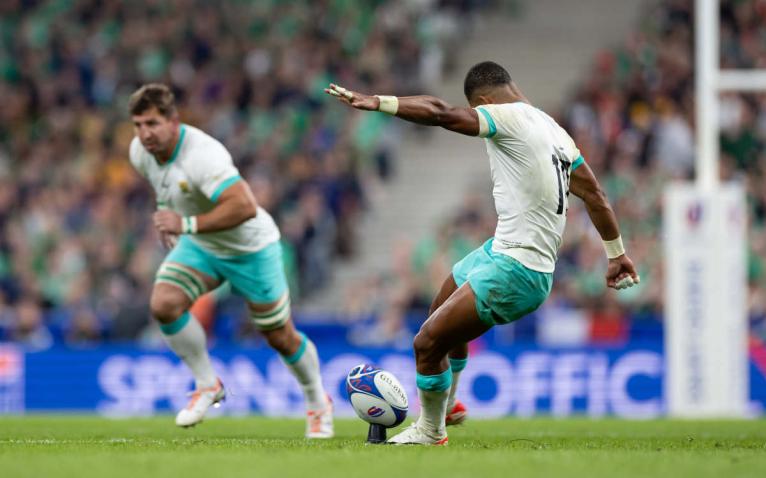The morning after the night before. Paris is awash with gentle sunshine under a blue sky dappled with white fluff. A Sunday market is slowly gathering pace. A young boy loses control of a football and causes a man to drop his baguette. A woman haggles over the price of silver spoons.
Are they unaware of what happened only nine hours earlier? Did they not feel the ground shake and the walls crack? Did they not hear the noise?
Those who did will never forget it. The events at the Stade de France on a crackling Saturday night won’t echo through eternity. Given the context of the match it might not even stand the test of time in the small ecosystem that is the rugby world. But for those who watched with slack jaws and bulging eyes as titans in green and white clattered each other for 80 minutes that felt like weeks, a lingering residue will remain
In a word, it was epic. Big events have a tendency of failing to live up to their own hype but this one delivered. The world’s number one team against the defending world champions. The 38-year-old Johnny Sexton against the human torpedo that is Pieter-Steph du Toit. The Bomb Squad and the 7-1 split. The wraparounds and popped passes. The most cohesive attack against the most resolute defence. Jean Kleyn playing against a country he had once adopted. Siya Kolisi in the French capital that will soon be his home. Executives around a table at Netflix’s headquarters would ask the script writers to jettison a theme or two to help the plot along.

In the end Ireland won it by a score. The main talking point during the game, straight after the game and even now has focused on the 11 points South Africa left behind from the kicking tee.
“Nee, fok, man,” slurred one burly Saffa on the train ride back to the city centre from Saint-Denis. “We were the better team. We should have won. If only we had a oke who can kick.”
It makes sense, right? The team with the most points at the final whistle is the one that wins. But emphasising Manie Libbok’s struggles with his right boot, and the two failed attempts from long range by Faf de Klerk, would be akin to judging a fruit tree’s yield by only picking from it’s lowest branches. There is a greater concern for the Springboks. And if they don’t resolve it immediately, even a better goal kicker might not save them down the road.
Ireland bossed the breakdown. Or, to put another glass-half-empty spin on it, South Africa got bossed at the breakdown. According to the reliable statistician, Ross Hamilton, South Africa nearly doubled Ireland’s average ruck speed. This was a staggering revelation after the fact as the eye-ball test suggested South Africa were third in a two horse race.
So, if it wasn’t speed, what was it then? One of Ireland’s most infamous sons, Connor McGregor, famously quipped that timing beats speed so perhaps the Irish were simply more clinical?

“I thought they were more accurate than us today, a bit faster to the breakdown,” Siya Kolisi offered as a way of explanation after the match. “We knew it was coming. We got to their 22, but the opportunities we lost were all through the breakdown. Us as players take full responsibility. Hopefully we meet them again but we need to be better with those opportunities.”
Jacques Nienaber was equally complimentary of the Irish, calling their work at the coalface “exceptional”, citing this as “one of the biggest reasons why we didn’t get momentum.”
How did this happen? Kolisi and his two allies in the back row, Jasper Wiese and du Toit, weren’t terrible. In fact, depending on what variables you consider most valuable when analysing the contribution of a flanker, they each put in commendable shifts.
Both Kolisi and du Toit made 12 tackles, more than any other South African. Jasper Wiese carried well in the loose and beat two defenders. Du Toit left his mark on Johnny Sexton and resumed his favourite past-time of hunting down the opposition’s fly-half. A couple of hits were just within the laws of the game as he crunched the Irish veteran only moments after the ball had been shovelled on.
But none of the South African loose forwards gained control where it mattered most. Josh van der Flier and Caelan Doris did. Peteter O’Mahony, playing his 100th Test match, showed all his experience in keeping the main thing the main thing, to steal a famous phrase from Rassie Erasmus.
The absence of Malcolm Marx and Duane Vermeulen was noticeable. The former is out injured but the latter was sat in the coach’s box wearing an ear piece as he sent down instructions to the pitch-side water carriers. He should have been on the field, doing what he does better than anyone else in the squad.

At 37-years-old, Vermeulen is not as mobile as he once was. His only other function appears to be receiving restarts and carrying back into the maw of onrushing tacklers. But it is immovability over the ball that is now evidently his greatest asset. How the Springboks needed his hefty frame.
Picking apart a team’s tactics after a defeat is the same as painting a bull’s-eye around an already shot arrow. Any insight gleaned from a former pro with a microphone or a journalist with a flair for rhetoric must be taken with a modicum of mistrust. There are few more astute rugby brains than the one shared by Nienaber and Erasmus. Casting aspersions on proven winners because of one poor result should be left to the trolls on social media.
However, it was noticeable that once Kwagga Smith entered the scene South Africa suddenly fizzed with greater effervescence at the ruck and breakdown. The former sevens star’s first contribution was to get his body over the ball and pinch a turnover. A natural fetcher is a rare commodity even at the elite level and if these two sides meet again in Paris with a little more riding on the result, there may be a temptation to start one.
This is what a Springboks defeat can do to the mind. Despite the evidence – South Africa have now lost five of the eight matches they’ve played against Ireland, France or New Zealand since the last World Cup – whenever the side loses a flood of introspection and anger bursts through the floodgates.
Its easy to question everything and anything. All at once doubt and suspicion seep through. Maybe the team is too old? Maybe Nienaber and Erasmus have lost their mojo? Maybe the northern hemisphere’s supremacy is truly at hand and all that we once believed to be sacrosanct in the game is little more than smoke and mirrors?
On the Eurostar back to London South African accents stand out. Libbok’s right foot and Handre Pollard’s return to the side are noteworthy topics conversation. Marx’s name gets a mention. So too does Ben O’Keeffe’s, the referee who had an outstanding game but was still criticised for a call at the death when Cobus Reinach thought he had the ball.

There is something missing in the discourse. Right over there, in seat 37 next to the window, is a trumpeting elephant that is barely getting a mention. It’s as if the fans chasing away the pain with some hair of the dog at 11 am have forgotten the most important component of an epic.
It’s as if the noise and colour and thunderous collisions of the night before have wiped clean their memories. Or maybe that intoxicating deluge of experiences have altered their perceptions. Have they now joined the woman haggling over cutlery and the irate man with street grime on his baguette?
Thankfully those at the wheel of the Springboks machine are not so ignorant. They recognised where they fell short. Now they need to fix it.


Its all well and good critising thr South African errors, but Ireland could also improve in many sectors. 4 lineouts in the first 15 minutes lost to bad throws. Multiple handling errors and giving away a few soft penalties. Ok, talk about the Boks 11 missed points, but what about the lost point chances by ireland chosing to go to bad lineout when they could just as easily have tried kicking for goal like SA . An epic battle but anyone that says SA should have won was only watching half a game.
Despite the provocation, and there is plenty here, true Ireland supporters will continue to adopt a respectful attitude towards our opposition, and give credit where it is due. We neither want nor need to engage in unpleasant hateful exchanges with fellow rugby enthusiasts. The Rugby World Cup is about bringing people together in a harmonious celebration of a sport we all appreciate. Sometimes your team will win, other times it doesn't. There is more to life than winning, or losing, a rugby game.
Ireland's breakdown "smarts" were and are borderline illegal, their tactics employed are disgraceful and if that's the way they need to win, then fine, considering u only won by 5 points to a, IMO, an 85% effective SA side, cool
The ref needs to learn what offsides is again and a maul, when it collapses and u have the ball, u are allowed to play and not blow the whistle. Again the ref was in your favour. If that's what Ireland needed to win, then cool, you only won by 5 point's.
We left far more off the table and opportunities than Ireland had and I think Rassie realised that. You gave your all and only won by 5, we still have more to go.
Relook at the game but please keep an open mind. Yes you will see where you felt aggrieved but you will see a list as long as your arm where the ref missed something, or got it wrong in favour of SAf. You will see multiple opportunitues missed by Ireland. The margin should have been greater than 5.
Hahaha, please keep taking as many victory laps as possible after a pool play win that only delivers you a probable QF against historically the greatest rugby nation. Now the fact that they are crap at the moment should bode well too. Although, Ireland have enough Kiwis, Aussies, and pacific island players to start a small war, so well done.
Don't worry bud, Ireland wouldn't compete if they solely rely on their own population and local players, I get what u are saying, the guys here or running high because they think we're sore losers. Ireland played their best, we were somewhat good average, let them enjoy the win and their import players, we will use our local talent, as we do with all our sides.....
Are you okay? Do you need a tampon ?
Did you read the article or are you just keyboard warrior-ing out of instinct? You know it was written by a (really good) journalist from SA right? Trust me, no one in Ireland needs to be reminded that (a) it was a pool match (b) SA could easily have won (C) Ireland's track record at RWC is poor. Ireland have huge respect for SA - look at Rassie, Jean De Villiers, De Allende, RG, Jean Kleyn, Pienaar, BJ Botha....... all coming here and adding something to the rugby culture. Would be nice to show a bit of class in defeat maybe.
"...Picking apart a team’s tactics after a defeat is the same as painting a bull’s-eye around an already shot arrow. Any insight gleaned from a former pro with a microphone or a journalist with a flair for rhetoric must be taken with a modicum of mistrust. There are few more astute rugby brains than the one shared by Nienaber and Erasmus..."
Well said! I expect Nienaber and Erasmus to come up with a "fix" to the breakdown issues should they face Ireland again. Whether that fix will deliver a result is not guaranteed but these are two impressive teams with Ireland continuing to hold the edge for now.